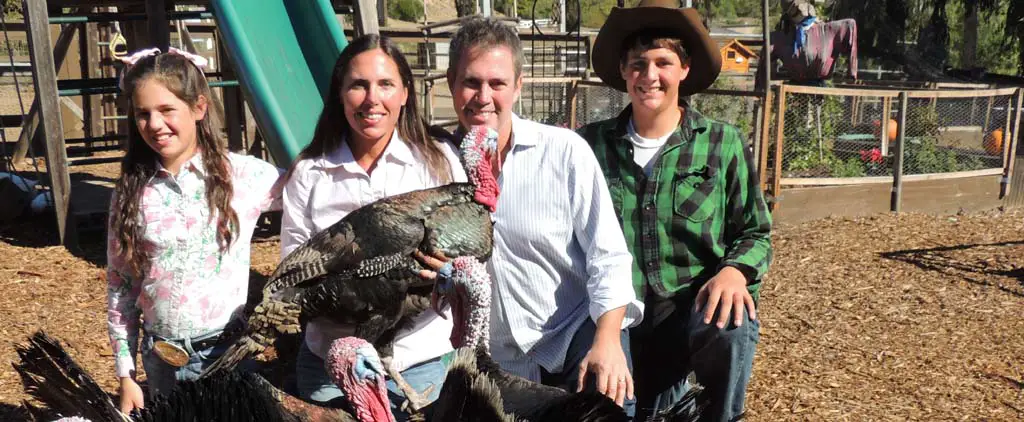ENCINITAS — Standing against the backdrop of their small backyard farm, the Sugarman family, complete with neat button-up shirts and spotless blue jeans, looks like a Norman Rockwell painting come to life. But make no mistake, this family is on a mission.Hoping to best the genetically engineered, commercial Butterballs, the family of four has spent months raising 15 turkeys as naturally as possible to raise awareness about local, sustainably raised animals and food.Elizabeth and Shawn along with their two kids, Samuel “Bubba,” 14, and Sissy, 11, invested considerable time and money to raise a specific strain of naturally bred turkeys, known at Heritage turkeys.
The Sugarmans have now sold their birds to friends and neighbors for Thanksgiving, hoping to help educate their buyers about where their food comes from.
“I think it’s hard for everyone to look at their food,” said Elizabeth. “But we have to be conscious of what we’re consuming.”
Heritage turkeys live outdoors, mate naturally, and have a slower growth rate than commercial turkeys, according to ALBC (American Livestock Breeds Conservancy). They are domesticated descendants of wild turkeys from North and South America, and are often associated with the turkeys of pilgrims.
“They are the turkeys that were here when the pilgrims came over on the Mayflower,” said Elizabeth. The family’s Heritage turkeys were given organic feed and allowed to run and fly about the family farm, called Sugar Sweet Farm.
Turkeys that are raised for commercial sales are often genetically engineered to produce meat at the lowest possible cost, according to the ALBC. As a result, these turkeys grow quickly on relatively little food and are unable to mate naturally.
“It’s Franken-food,” said Elizabeth about the turkeys bred for mass commercial consumption.

Commercial turkeys are also specifically selected to grow large breasts, while Heritage turkeys develop muscle meat more proportionally from running and flying.
But as a trade-off for being raised naturally, Heritage turkeys are more expensive to raise and consequently more expensive to buy.
The Sugarmans bought specially ordered organic turkey feed at $34 per bag, compared to non-organic turkey feed at about $18 per bag.
Heritage turkeys take about six to eight months to reach their ideal size before being slaughtered, while commercial turkeys only take about four to six months, according to Elizabeth.
This year, the family barely broke even by selling the turkeys for $6 per pound and including a $30 fee to have the turkeys slaughtered at an FDA-certified farm.
Fresh turkeys from grocery stores typically range from $1 to $3 per pound, while organic and free-range turkeys range from $4 to $8 per pound.
In addition to raising these birds naturally, the Sugarmans also strove to educate their turkey buyers about food. The family recently hosted a party where their buyers weighed and selected their birds. The party helped buyers learn about where their food comes from and allowed them to “really connect with their food,” Elizabeth said.
The Sugarmans even ensure that the birds are comfortable on their way to the farm where they will be harvested, transporting them in a spacious horse trailer covered in pine shavings.
“If their (turkeys’) destiny is, from the time they are born, to make this sacrifice, that’s something we can’t change. But what we can change is the quality of their lives while they are here,” said Elizabeth.
The Sugarman family was first introduced to Heritage turkeys last year through the Olivenhain Valley 4-H Club, which teaches youth leadership skills through projects involving raising animals and making crafts.
They raised 14 turkeys, 11 of which were bought by Slow Food Urban San Diego for the organization’s 2011 Thanksgiving dinner at UCSD.
“We thought they would be like giant chickens,” Elizabeth laughed, and she would know. The Sugarman family also raises chickens, ducks, rabbits, lambs, goats, a horse, a donkey, honeybees and other animals right in their backyard.
“My wife and I had a deal that she wouldn’t ask for jewelry or clothes, she’d only ask for animals,” said Shawn, who was the former president of the juice company Odwalla, and now works as a private consultant.
The family views their farm largely as an educational opportunity for Bubba and Sissy, who are home schooled.
Together, the kids sell fresh eggs and honey from the farm, as well as homemade jam.
They also have raised and sold livestock, including steer and lambs, at the San Diego County Fair’s junior livestock auction through the 4-H market program.
They have shown rabbits and dairy animals at the fair as well, and hope that the competition will soon open a category for animals raised sustainably.
“The problem is that an organically raised lamb won’t look as good as others at the fair,” explained Sissy. Because the fair competitors want to win prizes, most kids will not raise animals sustainably.
Even with this challenge, two of the Sugarmans’ organic turkeys have won prizes at the fair in recent years.
To learn more about Sugar Sweet Farm or inquire about purchasing their sustainably-raised livestock, check out the family’s website at sugarsweetfarm.com.




1 comment
Just a correction, the correct URL for the website is http://www.sugarsweetfarm.com (no s at the end as noted on the article).
Comments are closed.